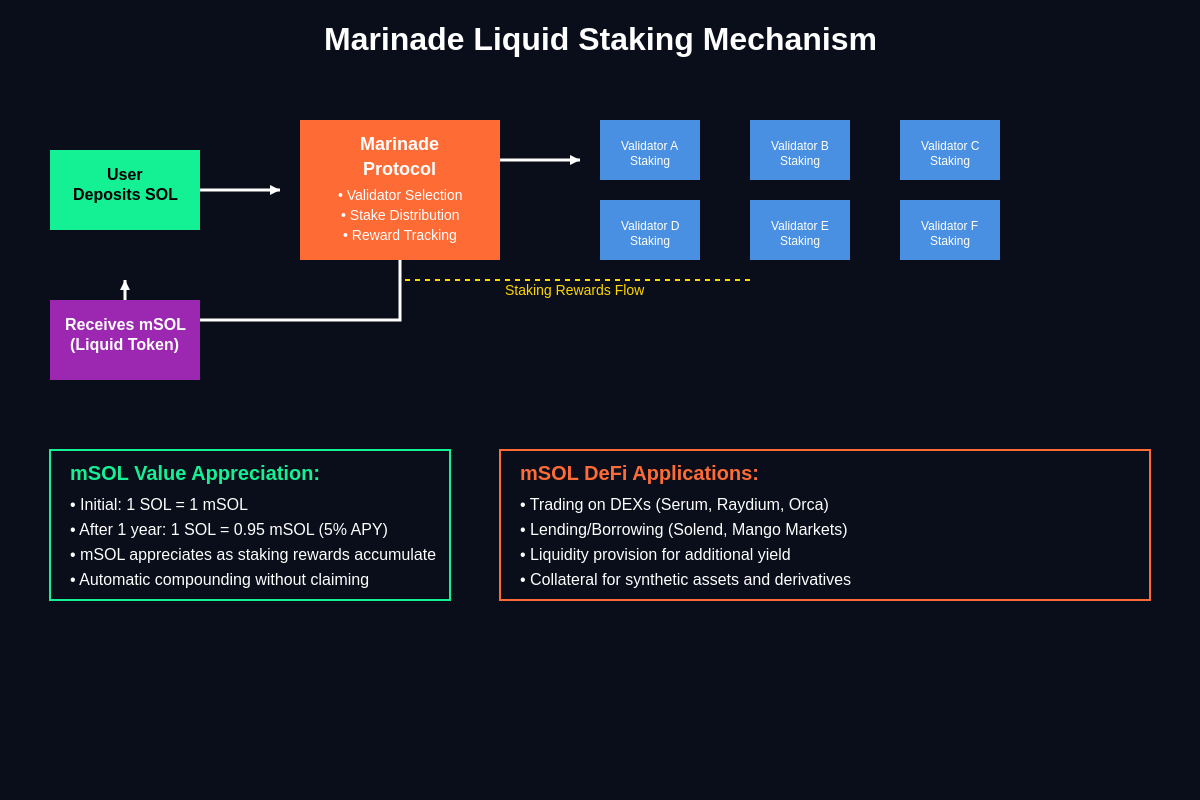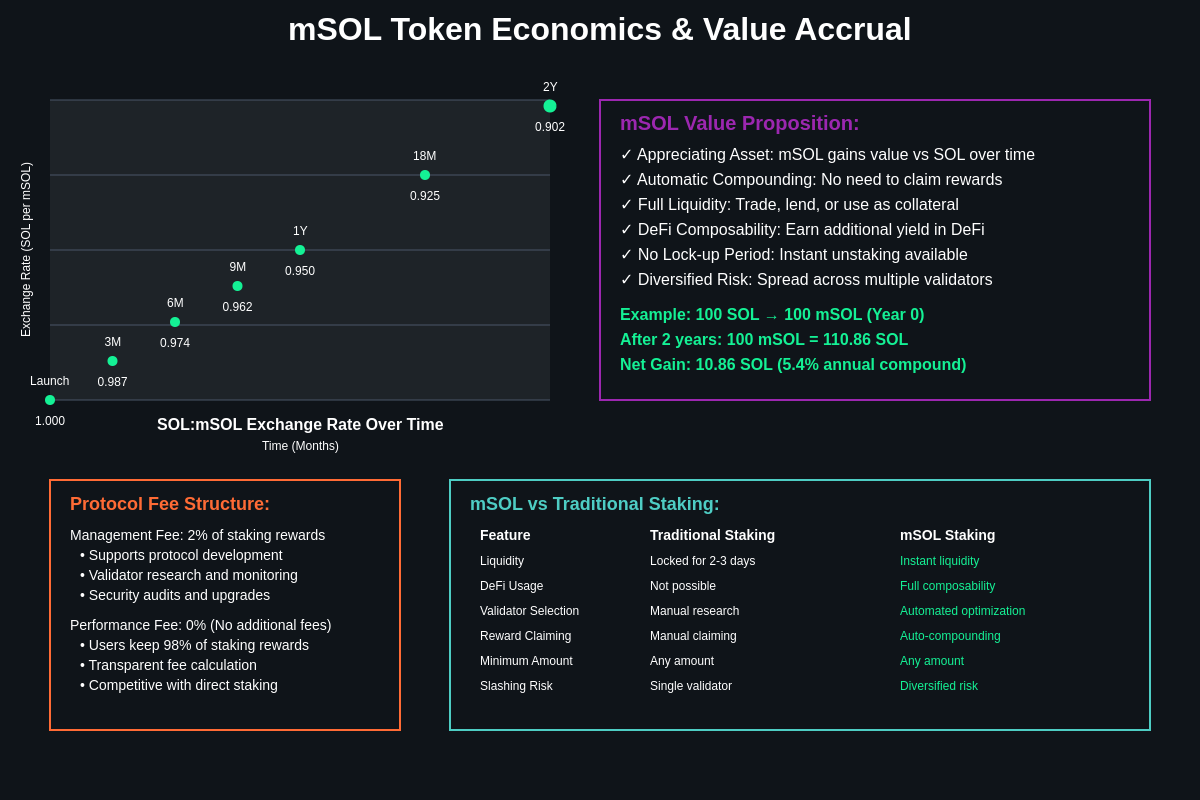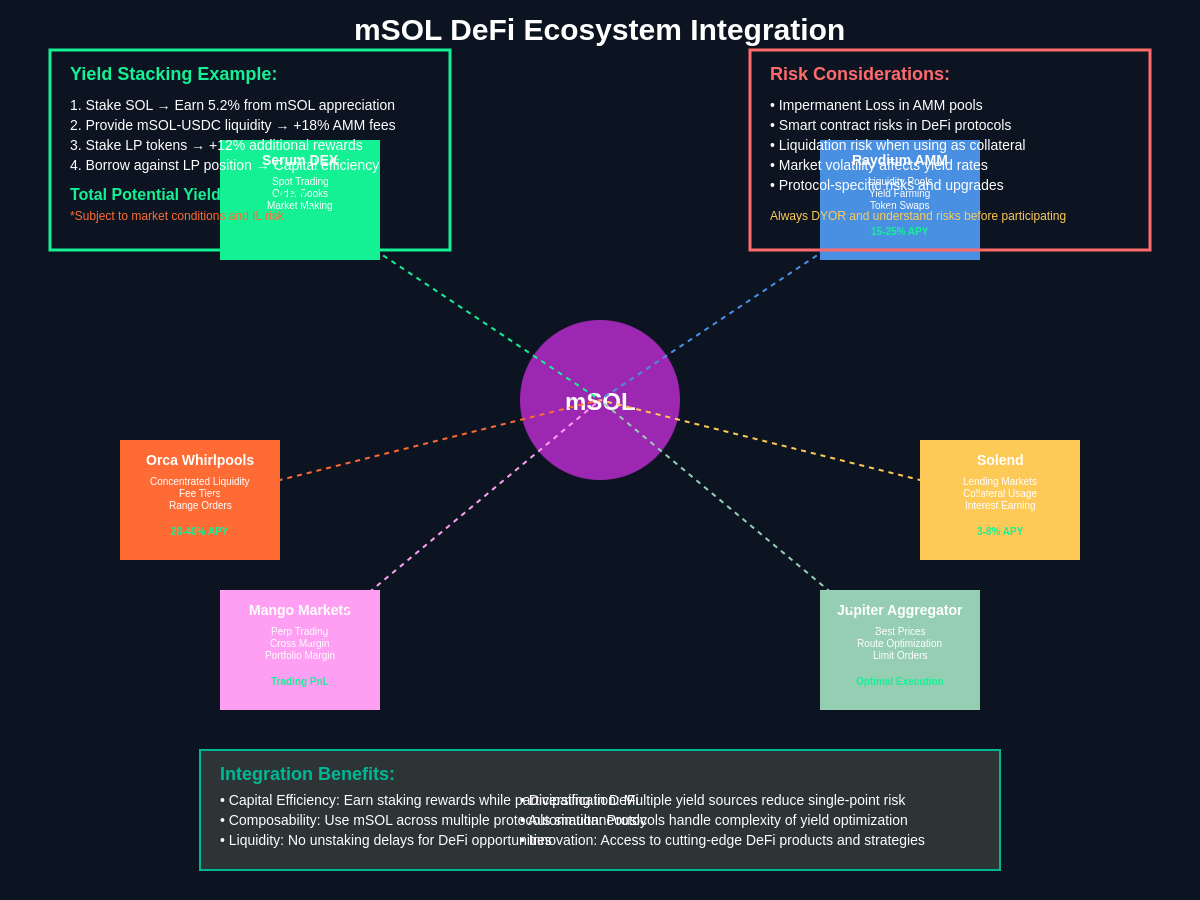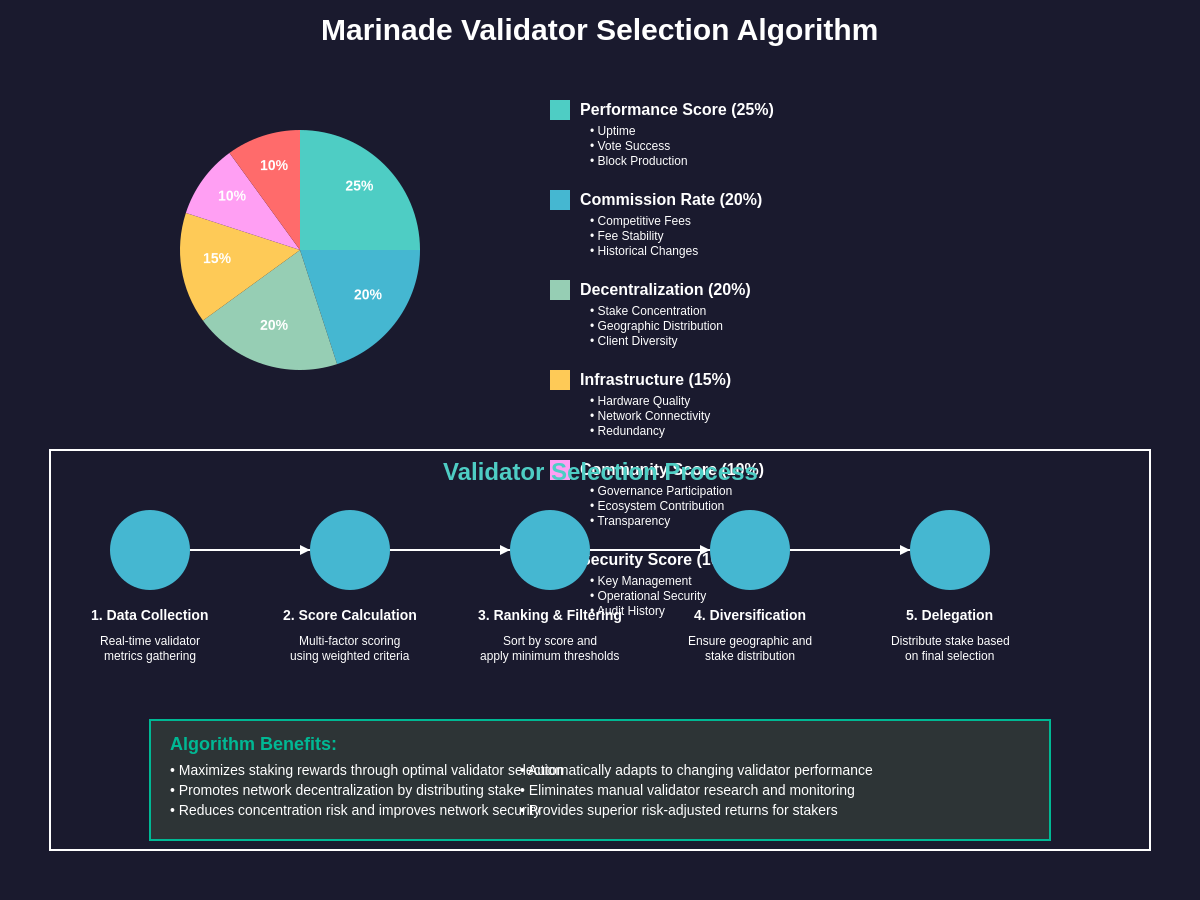Get started with liquid staking analysis
The Evolution of Staking on Solana
Marinade Finance has emerged as the leading liquid staking protocol on Solana, fundamentally transforming how users participate in network validation while maintaining liquidity and capital efficiency. The protocol addresses the traditional trade-off between earning staking rewards and maintaining access to staked capital, enabling users to stake their SOL tokens while receiving liquid mSOL tokens that can be used across the broader Solana DeFi ecosystem.
The liquid staking revolution represents a paradigm shift from traditional proof-of-stake mechanisms where staked tokens remain locked and illiquid during the staking period. Marinade Finance introduces a sophisticated delegation strategy that distributes staked SOL across multiple validators while providing users with immediately tradeable mSOL tokens that represent their staked position and accumulated rewards. This innovation has unlocked billions of dollars in previously idle staking capital, creating new opportunities for yield generation and capital deployment across Solana’s rapidly expanding decentralized finance landscape.
The protocol’s impact extends beyond individual user benefits to strengthen Solana’s overall network security and decentralization by implementing intelligent validator selection algorithms that distribute stake across high-performance validators while avoiding concentration risks that could threaten network stability. Monitor Solana staking metrics to understand the broader ecosystem implications of liquid staking adoption.
Understanding Marinade’s Liquid Staking Mechanism
Marinade Finance operates through a sophisticated smart contract system that automates the staking process while maintaining optimal validator distribution and performance metrics. When users deposit SOL tokens into the Marinade protocol, the system mints mSOL tokens at the current exchange rate, which reflects the accumulated staking rewards and represents the user’s claim on the underlying staked SOL plus earned rewards.

The protocol’s validator selection algorithm continuously monitors validator performance metrics including commission rates, uptime statistics, voting participation, and stake concentration to ensure optimal delegation strategies that maximize rewards while maintaining network decentralization. This automated approach removes the complexity and ongoing management requirements that individual stakers face when selecting and monitoring validators, while providing superior diversification and risk management compared to single-validator staking strategies.
mSOL tokens appreciate in value relative to SOL over time as staking rewards accumulate within the protocol, creating a seamless user experience where holding mSOL automatically compounds staking rewards without requiring active management or regular claiming of rewards. The liquid nature of mSOL enables users to trade, lend, borrow, or provide liquidity across Solana DeFi protocols while continuously earning staking rewards, effectively eliminating the opportunity cost traditionally associated with staking participation.
Technical Architecture and Smart Contract Design
The Marinade Finance protocol consists of multiple interconnected smart contracts that handle different aspects of the liquid staking process, including stake pool management, validator selection, reward distribution, and liquidity provisioning. The core stake pool contract manages the collective SOL deposits and maintains the mapping between mSOL tokens and underlying staked positions, while implementing sophisticated accounting mechanisms to track rewards and handle unstaking requests.
The validator selection system operates as a separate module that implements Marinade’s proprietary scoring algorithm to evaluate and rank validators based on multiple performance criteria including historical uptime, commission rates, voting participation, and stake concentration levels. This system automatically rebalances stake distribution to maintain optimal validator diversity while maximizing expected returns for protocol participants.
The protocol incorporates advanced risk management features including emergency unstaking mechanisms, validator blacklisting capabilities, and automated rebalancing triggers that protect user funds while maintaining protocol stability during adverse network conditions. These technical safeguards ensure that the protocol can continue operating effectively even during network disruptions, validator failures, or other exceptional circumstances that might impact traditional staking operations.
mSOL Token Economics and Value Accrual
The mSOL token represents a fundamental innovation in liquid staking token design, implementing an appreciating token model where the exchange rate between mSOL and SOL increases over time as staking rewards accumulate within the protocol. This design eliminates the complexity of separate reward tokens while providing automatic compounding of staking returns through simple token holding.

The mSOL exchange rate calculation incorporates the total staked SOL, accumulated rewards, and any pending unstaking amounts to ensure accurate valuation that reflects the true underlying value of staked positions. This transparent pricing mechanism enables seamless integration with DeFi protocols, automated market makers, and other applications that require reliable price feeds for liquid staking tokens.
The protocol’s fee structure includes a small management fee that supports ongoing development, validator research, and protocol maintenance while ensuring that the majority of staking rewards flow directly to mSOL holders. This sustainable economic model aligns protocol incentives with user interests while providing the resources necessary for continued innovation and protocol improvement. Track mSOL performance across different market conditions to understand token economics in practice.
DeFi Integration and Composability
Marinade Finance has achieved extensive integration across the Solana DeFi ecosystem, with mSOL tokens accepted as collateral, liquidity provision assets, and trading pairs across major protocols including Serum, Raydium, Orca, and Solend. This broad adoption has created multiple yield-generating opportunities for mSOL holders who can earn additional returns through lending, liquidity provision, and trading activities while maintaining their underlying staking yield.

The composability of mSOL tokens enables sophisticated yield farming strategies where users can simultaneously earn staking rewards, trading fees from automated market maker pools, lending interest from money market protocols, and additional token incentives from various DeFi projects. This yield stacking capability has made mSOL one of the most capital-efficient assets in the Solana ecosystem, attracting significant capital from both retail and institutional participants.
The protocol’s integration partnerships extend beyond DeFi to include wallet providers, portfolio management tools, and institutional custody solutions that recognize mSOL as a liquid representation of staked SOL. This broad ecosystem support has been crucial for driving adoption and establishing mSOL as a widely accepted standard for liquid staking on Solana.
Validator Selection and Network Decentralization
Marinade Finance implements one of the most sophisticated validator selection mechanisms in the liquid staking space, utilizing a multi-factor scoring system that evaluates validators across numerous performance and decentralization metrics. The algorithm considers validator commission rates, historical performance, geographic distribution, infrastructure diversity, and stake concentration to create a balanced delegation strategy that supports network health while maximizing user returns.

The protocol’s commitment to decentralization extends beyond simple stake distribution to include active support for smaller validators and geographic diversity initiatives that strengthen Solana’s censorship resistance and operational resilience. By automatically distributing stake to high-quality validators regardless of their current stake levels, Marinade helps prevent validator concentration that could threaten network security and decentralization.
The validator research team continuously monitors network conditions, validator performance, and emerging threats to ensure that the delegation strategy adapts to changing network dynamics while maintaining optimal risk-adjusted returns for protocol participants. This active management approach provides superior outcomes compared to static delegation strategies while reducing the complexity and time requirements for individual stakers.
Risk Management and Security Measures
The Marinade Finance protocol incorporates comprehensive risk management systems designed to protect user funds while maintaining operational flexibility and capital efficiency. The smart contract architecture includes multiple security layers including access controls, emergency pause mechanisms, and automated safety checks that prevent unauthorized actions or protocol manipulation.
The protocol’s validator risk management system continuously monitors delegated validators for performance degradation, malicious behavior, or other risk factors that could impact user returns or protocol security. Automated systems can quickly redistribute stake away from problematic validators while blacklisting capabilities prevent future delegation to validators that demonstrate concerning behavior patterns.
Security audits by leading blockchain security firms have validated the protocol’s smart contract code and operational procedures, while ongoing monitoring and incident response capabilities ensure rapid detection and mitigation of potential security threats. The protocol maintains comprehensive insurance coverage and emergency response procedures to protect user funds in the event of unforeseen security incidents or protocol failures.
Institutional Adoption and Enterprise Solutions
Marinade Finance has developed specialized solutions for institutional clients including treasury management tools, custom reporting capabilities, and white-label liquid staking services that enable enterprises to efficiently manage large SOL holdings while maintaining liquidity and earning competitive returns. These institutional features have attracted significant adoption from crypto funds, DAOs, and other large holders seeking professional-grade staking solutions.
The protocol’s institutional offerings include advanced risk management tools, custom validator selection criteria, and dedicated support services that address the unique requirements of professional investors and treasury managers. Integration with institutional custody providers and portfolio management platforms enables seamless incorporation of liquid staking into existing investment workflows and reporting systems.
Regulatory compliance features including detailed transaction reporting, tax optimization tools, and audit trail capabilities support institutional adoption by addressing the complex compliance requirements that professional investors face when participating in staking activities. These enterprise-grade features position Marinade as the preferred liquid staking solution for sophisticated market participants.
Performance Metrics and Yield Optimization
The Marinade Finance protocol has consistently delivered competitive staking yields while maintaining superior liquidity and capital efficiency compared to traditional staking approaches. Historical performance data demonstrates the protocol’s ability to optimize validator selection and reward distribution to maximize net yields for participants while maintaining protocol sustainability through reasonable fee structures.
Performance optimization extends beyond simple yield maximization to include risk-adjusted return metrics that account for validator concentration risk, slashing potential, and liquidity premiums associated with different staking approaches. The protocol’s sophisticated analytics capabilities enable continuous refinement of delegation strategies based on changing network conditions and validator performance patterns.
Benchmark comparisons with alternative staking solutions consistently demonstrate Marinade’s superior risk-adjusted returns, particularly when accounting for the additional yield opportunities available through mSOL’s DeFi composability and the reduced operational overhead associated with automated validator management. Analyze staking yield trends to understand market dynamics affecting liquid staking returns.
Governance and Protocol Evolution
The Marinade Finance protocol operates under a progressive decentralization model that gradually transitions governance authority from the founding team to the broader community of protocol participants and stakeholders. The governance framework includes mechanisms for protocol parameter adjustment, validator whitelist management, and strategic decision-making that ensure the protocol continues evolving to meet user needs and market conditions.
Community governance participation extends beyond simple voting to include validator research contributions, protocol improvement proposals, and active participation in ecosystem development initiatives that strengthen Solana’s liquid staking infrastructure. This collaborative approach has fostered a strong community of engaged participants who contribute to protocol development and ecosystem growth.
The protocol’s roadmap includes plans for additional governance token distribution, expanded voting capabilities, and integration with emerging governance frameworks that will further decentralize protocol control while maintaining the operational efficiency necessary for competitive performance in the liquid staking market.
Ecosystem Impact and Network Effects
Marinade Finance has become a cornerstone of Solana’s DeFi infrastructure, with mSOL serving as a foundational asset that enables new types of financial products and services across the ecosystem. The protocol’s success has demonstrated the viability of liquid staking as a fundamental primitive that can unlock previously inaccessible capital while strengthening network security through improved validator distribution.
The network effects generated by Marinade’s adoption create positive feedback loops that benefit all ecosystem participants through increased liquidity, improved price discovery, and enhanced capital efficiency. As more protocols integrate mSOL and more users adopt liquid staking, the utility and value proposition of the protocol continues to expand, attracting additional capital and driving further innovation.
The protocol’s influence extends beyond Solana to include cross-chain initiatives and collaboration with other liquid staking protocols that aim to establish universal standards and interoperability frameworks for liquid staking assets across different blockchain networks.
Future Developments and Roadmap
The Marinade Finance development roadmap includes significant enhancements to validator selection algorithms, expanded DeFi integrations, and new product offerings that will further cement the protocol’s position as the leading liquid staking solution on Solana. Planned improvements include real-time validator performance monitoring, dynamic delegation adjustments, and advanced risk management capabilities that will optimize returns while minimizing exposure to validator-related risks.
Cross-chain expansion initiatives aim to bring Marinade’s liquid staking expertise to other proof-of-stake networks while maintaining the protocol’s focus on Solana as its primary market and development focus. These expansion efforts will create new opportunities for users to access liquid staking benefits across multiple networks while leveraging Marinade’s proven technology and operational expertise.
Research and development efforts continue to explore emerging opportunities in areas including validator infrastructure optimization, MEV capture and distribution, and integration with next-generation DeFi protocols that will create new value streams for liquid staking participants while advancing the overall sophistication of the Solana ecosystem.
Disclaimer: This article is for educational and informational purposes only and should not be construed as financial advice. Cryptocurrency investments carry inherent risks, including the potential for total loss of capital. Liquid staking involves additional risks including smart contract vulnerabilities, validator performance risks, and protocol-specific risks that may result in losses. Readers should conduct their own research and consult with qualified financial advisors before making investment decisions. The author and publisher are not responsible for any financial losses that may result from the use of information contained in this article. Past performance does not guarantee future results, and all investments should be considered carefully within the context of individual risk tolerance and investment objectives.